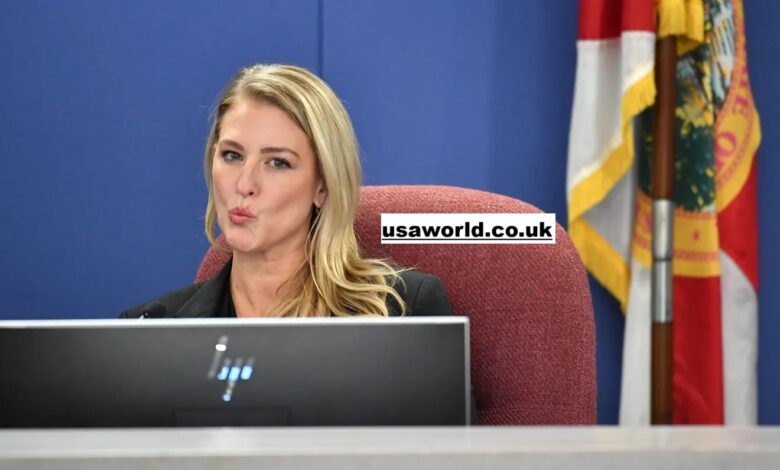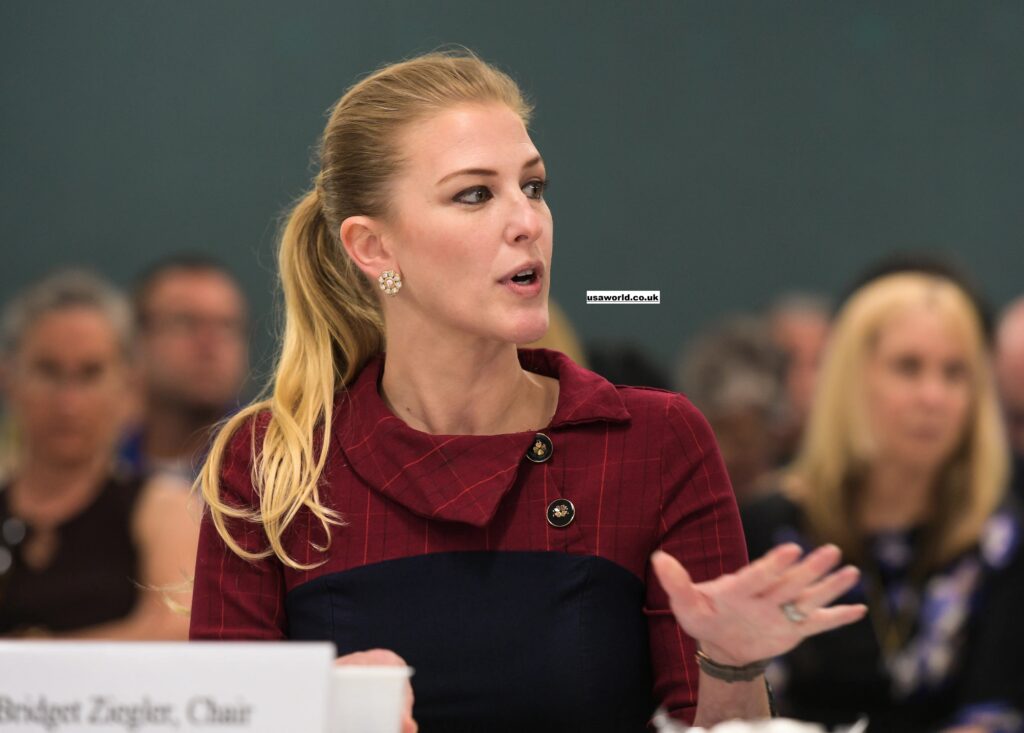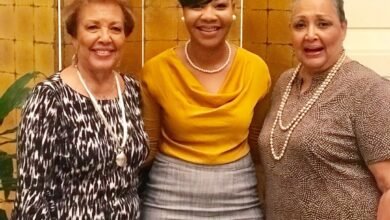Bridget Ziegler: A Complex Figure in Education, Politics, and Public Discourse

Introduction: Who Is Bridget Ziegler?
Bridget Ziegler is a name that has become increasingly prominent in the intersections of politics, education, and cultural debate. While once primarily known for her role in local school board politics, she has since become a recognizable figure in national conversations surrounding parental rights in education, curriculum transparency, and broader sociopolitical controversies. Her journey has been layered with support, criticism, alliances, and controversies that make her both an admired and polarizing figure depending on where one stands.
To understand Ziegler, one cannot simply glance at headlines or fleeting mentions on social media. Her story involves a blend of personal conviction, strategic positioning, and the broader political climate that has elevated school boards into battlegrounds of American ideology. It’s this mixture of personal values and national spotlight that sets her apart as more than just another political personality.
Her identity is not solely tied to her position on a school board but also to the movement she has represented. She embodies the rise of parents demanding greater involvement in their children’s education, while also standing as a political player aligned with broader conservative initiatives. This dynamic makes her both a local and national figure in an age where education has become inseparable from politics.
In many ways, Bridget Ziegler exemplifies the evolving face of grassroots leadership turned national spotlight figure—someone who can no longer be confined to local politics because the debates she engages in are inherently universal.
The Early Stages: From Local Activism to Public Spotlight

Bridget Ziegler’s entry into the public eye wasn’t accidental. It emerged from a mixture of personal interest, political alignment, and a readiness to step into a role where parents and citizens increasingly demanded representation. Her initial recognition largely came from her election to the Sarasota County School Board in Florida, where she became one of the youngest members to hold such a position. This role placed her at the nexus of decision-making that directly impacted local families, teachers, and students.
At the start, her focus seemed to align with typical school board concerns—budgeting, resource allocation, and maintaining high standards for local schools. However, as national conversations about education shifted toward curriculum content, parental rights, and inclusivity policies, Ziegler found herself drawn deeper into debates that transcended ordinary governance. In this environment, she began cultivating a persona as a representative voice for parents who felt unheard.
Her appeal stemmed from her ability to frame complex educational policies into approachable, everyday language. While some saw this as refreshing and necessary, others criticized it as oversimplification or pandering. Regardless, her approach resonated strongly with those who wanted education policy to reflect family values rather than abstract bureaucracy.
By positioning herself as a spokesperson for parental empowerment, she tapped into a broader movement across the United States, where parents sought more control over what their children were taught in classrooms. What started as a local seat turned into a microphone amplifying her influence far beyond Sarasota.
Bridget Ziegler and the Parental Rights Movement
Perhaps one of the most significant aspects of Ziegler’s career has been her role in the parental rights movement. This movement argues that parents should have the primary say in their children’s educational experiences—whether in areas of curriculum content, school library materials, or classroom policies. For supporters, this stance resonates as a reaffirmation of traditional family roles in education. For critics, it risks undermining professional educators and excluding marginalized voices.
Ziegler positioned herself at the center of this conversation, not merely as a participant but as an influencer shaping how the debate is framed. Her advocacy emphasized transparency: parents should know what is being taught, what materials are accessible, and how school policies align with family values. By doing so, she aligned herself with a growing chorus of conservative figures nationwide who viewed education as the frontline in broader cultural debates.
The parental rights movement gained momentum particularly during the pandemic, when remote learning gave parents unprecedented visibility into classroom instruction. Ziegler’s messaging capitalized on that moment, reinforcing the idea that parental involvement was not only beneficial but essential. Her ability to articulate this message made her an indispensable figure within conservative circles.
However, her centrality in the movement has also made her a lightning rod for criticism. Opponents argue that the parental rights narrative can sometimes serve as a disguise for exclusionary or discriminatory policies, particularly when it comes to LGBTQ+ inclusivity or the teaching of certain historical perspectives. Ziegler has had to navigate these criticisms while maintaining her role as a figurehead, a balancing act that continues to define her career.
Political Ties and Broader Influence
Beyond her role as a school board member, Bridget Ziegler has cultivated deep political ties that extend her influence beyond education. She has connections with Republican leadership in Florida, including Governor Ron DeSantis, whose political platform has often overlapped with Ziegler’s advocacy. This alliance has not only elevated her profile but also placed her within a larger political machinery that uses education as a wedge issue in state and national elections.
Her co-founding of the organization Moms for Liberty is another example of her broader political reach. This group has become a national presence, advocating for parental rights in education while often endorsing conservative candidates for school boards across the country. Although the organization has been praised for mobilizing parents, it has also been criticized for fostering divisiveness and amplifying culture war rhetoric.
These political alliances demonstrate that Ziegler is not simply a local figure. Instead, she operates within a network of political advocacy groups, think tanks, and public officials who see education as central to their ideological strategies. In many ways, she represents the modern convergence of grassroots activism with institutional power—a blend that has proven both effective and controversial.
This influence extends into media presence as well. Ziegler has appeared in interviews, podcasts, and national discussions, positioning herself as not only a policymaker but also as a public commentator. Her ability to straddle the line between local governance and national commentary has cemented her as a recognizable figure in political discourse.
Controversies and Criticism
No public figure who operates at the crossroads of politics and education escapes controversy, and Bridget Ziegler is no exception. Her stances on parental rights, curriculum policies, and inclusivity measures have made her a polarizing figure. Supporters laud her for standing firm on principles they believe protect families, while critics accuse her of advancing an agenda that marginalizes vulnerable student populations.
One recurring criticism centers on LGBTQ+ rights within schools. Policies supported by Ziegler and her allies have been labeled by opponents as exclusionary or harmful to LGBTQ+ students. Critics argue that under the guise of “parental rights,” such measures can restrict discussions of gender identity, sexual orientation, and inclusivity—topics they believe are essential to creating safe and welcoming school environments.
Ziegler has also faced scrutiny over her political affiliations and the influence of external organizations on local school governance. Some question whether her priorities reflect the immediate needs of Sarasota’s schools or broader political ambitions. These criticisms highlight the tension between local responsibility and national influence in her career.
Despite these controversies, her political resilience is noteworthy. Ziegler has managed to maintain influence even as debates around her policies intensify. This resilience suggests that her presence in political and educational discourse will not fade easily, regardless of the opposition she faces.
Conclusion: The Legacy and Future of Bridget Ziegler
Bridget Ziegler’s story is still unfolding, but her trajectory already tells us much about the future of American education and politics. She embodies the new reality that school board members are no longer confined to local issues but are instead actors on the national stage. Her role in the parental rights movement, her alliances with state and national leaders, and her presence in public discourse all signify a transformation in how education is politicized.
Whether one admires her as a courageous advocate for parental empowerment or critiques her as a divisive political player, there is no denying that Ziegler has reshaped the conversation. She has pushed the boundaries of what it means to serve on a school board, elevating the role into one with national consequence.
The legacy she leaves will depend on perspective. To her supporters, she represents a necessary corrective in education policy, a voice ensuring that parents are never sidelined. To her critics, she is a cautionary tale of politics encroaching too deeply into classrooms. Regardless of where one falls on that spectrum, Bridget Ziegler’s influence is undeniable.
As debates about education, parental rights, and inclusivity continue, her name will likely remain prominent. Her journey reflects not just her personal convictions but also the broader cultural and political tides of our time. In that sense, Bridget Ziegler is not just a school board member—she is a symbol of the battles shaping the future of education in America.



